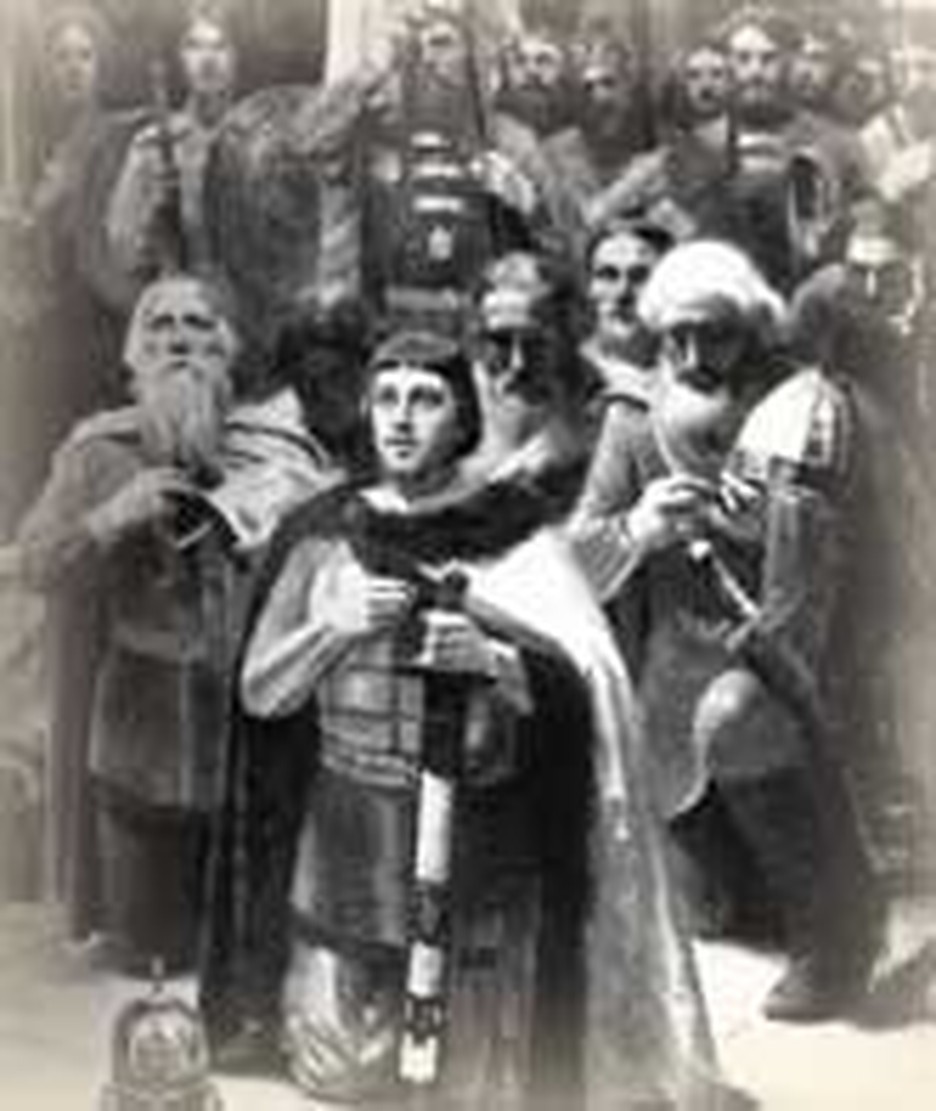
Metropolitan Cyril, leader of the Russian Orthodox Church, was serving the Divine Liturgy in the city of Vladimir on this day, November 14, 1263. Suddenly he saw a picture in his mind that caused him to vary from the traditional ceremony. According to Russian tradition he said, "Brethren, know that the sun of the Russian Land has now set." He had just witnessed Alexander Nevsky's soul being carried into heaven.
Nevsky, exhausted as he returned from a laborious trip east to his overlord, the great Khan of the Mongols, had rested at a monastery in Gorodetz. There he died on this day, November 14, 1263, dressed in a monk's clothes. He was only forty-three years old, but in that short life became one of the greatest Christian and military leaders that Russia ever produced. Even the atheistic Soviet regime honored him.
Born into a princely family in northeast Russia, Alexander was thrust as a teenager into difficult leadership roles. He had to try to hold together many quarrelsome and independent rulers. That he was able to do so most of the time was owing to his personal charm and his deep spirituality. His devout parents had raised him in the Orthodox faith, teaching him to honor God. As a boy, he spent much time reading the Bible.
The name Nevsky was given to him for a youthful exploit. The Catholic Swedes invaded Orthodox Russia with whom they had military and religious disputes. Alexander foresaw the invasion and planted sentries at strategic spots. Warned by them when the invasion came, he did not dither, but marched his troops rapidly to the Neva river where the Swedes were disembarking. To get there, he had to overcome the marshes that spread out between the two armies. But Alexander was inspired to heroics because he feared that defeat at the hands of Sweden would mean the end of Russian Orthodoxy, which he saw as the soul of his nation. On paper, his army did not stand a chance. The Mongol invasions had weakened Russia. Yet Alexander told his men, "God is not on the side of force, but of the just case, the truth."
The Swedes were so confident of victory that they did not unload their troops quickly. Their commander lolled in a golden tent. Marching through mist, twenty year old Alexander caught them by surprise. He routed the Swedes. Alexander was given the name Nevsky because of that battle at the Neva River.
The young hero went on to defeat Europe's Teutonic Knights in the famous "Battle on the Ice" and also overcame the Lithuanians. However, he saw that he could not beat the Mongols. Alexander consulted with Metropolitan Cyril to learn God's will. The religious leader advised him to yield in everything except faith. Alexander submitted. Since the Mongols required conquered rulers to bow before the Mongol idols and perform pagan rites, Alexander prepared to die. In their camp, he boldly proclaimed his Christianity and swore he would bow to no handmade image. Impressed by his military exploits and personal boldness, Khan Batu waived the usual ceremony!
Alexander survived three trips to the distant Mongol court. He often had to appease the fierce Asian rulers because of the hot-headed actions of his followers. Russians quickly recognized him as a saint after his early death.
Resources:
- "Alexander Nevsky." (Bartleby.com).
- Howe, Sonia E. Some Russian Heroes Saints and Sinners Legendary and Historical. (Philadelphia: J. B. Lippincott, 1917), source of the portrait.
- "Life of St. Alexander Nevsky." http://members.tripod.com/~shtyetz_john/life-of-st-alexander.html
- "St. Alexander Nevsky." Orthodox America. http://www.roca.org/OA/79/79h.htm
- "St Prince Alexander Nevsky's Cronicle" [sic] http://www.ticketsofrussia.ru/lavra/s_nevsk.html
Last updated June, 2007








